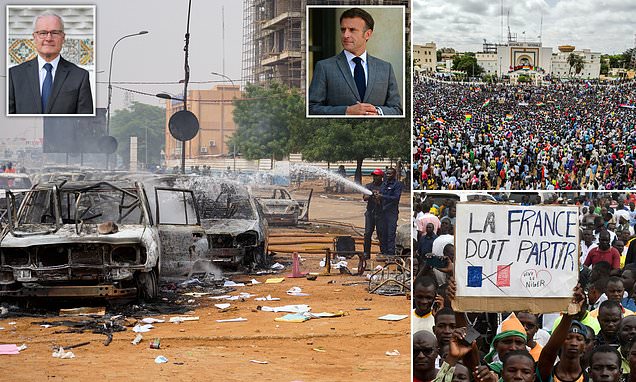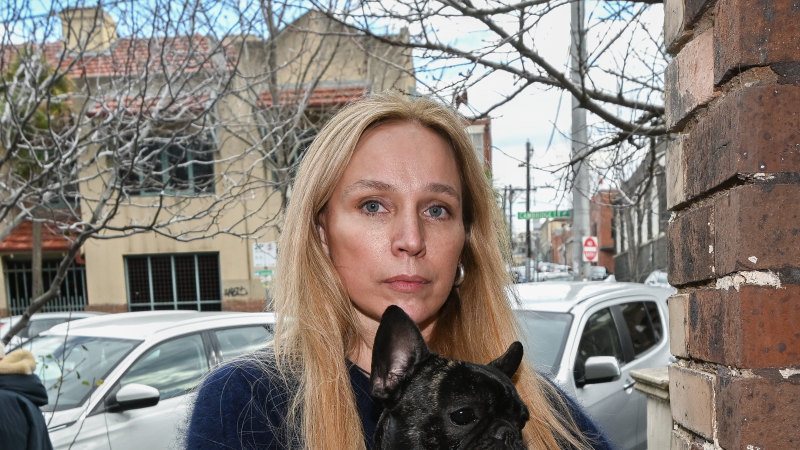Emmanuel Macron scolds his spy chief over failure to predict brutal Niger coup after French embassy was torn apart by rioters as war-torn nation descends into chaos
- Macron has sought an ally in Niger amid regional insecurity and insurgency
- France was previously forced to pull out of Mali and Burkina Faso after coups
French President Emmanuel Macron has criticised his chief spy over his failure to predict the Niger coup.
He said that Bernard Émié, 64, director of France’s foreign intelligence agency, should have foreseen the overthrowing of President Bazoum by a junta on July 26.
The director of the Directorate-General for External Security (DGSE) said that he had issued a warning earlier this year and that it was ignored by the government.
It followed attacks on the French Embassy in Niger on Sunday as thousands backing the coup marched through the capital denouncing France and waving Russian flags.
The coup in Niger represents a major setback for Macron, raising questions about France’s military presence in the country and wider strategy in Africa, analysts say.
The coup against Niger’s President Bazoum is the third such putsch in the region in three years, following similar clashes in Mali and Burkina Faso in 2021 and 2022 that forces French troops to pull out.
Macron (right) slammed Émié (left) for not predicting the coup. Émié retorted that he had warned of the possibility, and that the French government had chosen not to act on it
A firefighter hoses torched cars near the Nigerien Party for Democracy and Socialism headquarters in Niamey, Niger, 27 July 2023
Protesters hold an anti-France placard during a demonstration on independence day in Niamey on August 3, 2023. It reads: ‘France must leave. Long live Niger’
Pro-junta demonstrators break down one of the doors of the French embassy building as violence erupted in Niger
Pro-junta demonstrators set fire to the French embassy before the army intervened to break up the crowd
The French embassy in Niger has been attacked as pro-Russian protesters marched through the capital after the pro western government was overthrown in a military coup
The last week has seen devastating scenes across the country as protests have erupted, borders closed and a curfew declared.
The coup began on July 26 when Niger’s presidential guard detained president Mohamed Bazoum and its commander general, Abdourahamane Tchiani, proclaimed himself the leader of a new military junta.
READ MORE: Niger’s pro-Western president is overthrown in military coup amid fears over Wagner Group’s growing influence in Africa
‘We, the defence and security forces… have decided to put an end to the regime’ of President Bazoum, Colonel-Major Amadou Abdramane said in a televised address late last Wednesday.
‘This follows the continued deterioration of the security situation, poor economic and social governance,’ he added, surrounded by nine other uniformed soldiers.
Niger has consistently been ranked on the bottom of the Human Development Index – an aggregated index of life expectancy, education and per capita income indicators.
The country has increasingly welcomed western support and is a key ally in a fight against Islamist insurgents in the region.
Situated in the middle of West Africa, a US drone base in the country allows allies to project power and manage the rising threats of instability and insurgency.
The country had also been one of the most cooperative in peace-keeping in the region, and foreign powers fear militants could gain ground under the junta.
The discovery of precious metals and rare elements across the region has also increased interest from foreign powers.
The coup is particularly devastating for Macron, who sought to make a special ally of Niger and a hub for France’s presence in the region after backing away from Mali.
In December 2018, Macron vowed that France would remain engaged in the fight against jihadists in the Sahel region of Africa ‘until the victory is complete’.
France has around 1,500 troops in the former French colony, according to France24.
Last Wednesday’s takeover marks the fifth coup in Niger since it gained independence from France in 1960.
‘History repeats itself, the setbacks are accumulating,’ Pascal Boniface, director of the French Institute of International and Strategic Affairs, told AFP.
‘If the putschists stay in power in Niamey [the capital], it will be very difficult to leave our soldiers there.’
Niger’s junta on Thursday said it was scrapping military pacts made between Niamey and France, following last week’s coup.
‘Faced with France’s careless attitude and its reaction to the situation’, the ‘National Council for the Safeguard of the Homeland decided to scrap the cooperation agreements in the field of security and defence with this state,’ one of the putschists said in a statement read out on television late on Thursday.
In light of the coup, Niger has been hit by a string of sanctions.
The EU has already withdrawn funding and military support due to the ‘unacceptable attack on the integrity of Niger’s republican institutions’.
The bloc had set aside $554mn of its budget, 2021-24, to support education, growth and governance.
General Abdourahamane Tchiani, Niger’s new strongman, speaking on national television on July 28 after the ousting of President-elect Mohamed Bazoum
Niger’s President Mohamed Bazoum refused to resign while detained at the palace
Thousands of anti-sanctions protestors gather in support of the putschist soldiers in the capital Niamey, Niger August 3, 2023
Thousands of anti-sanctions protestors gather in support of the putschist soldiers in the capital Niamey, Niger August 3, 2023. The sign reads ‘Down with France long live CNSP’
Resentment has grown in West Africa among those who see France’s continued involvement as a neocolonial project.
Protestors in Niger have been seen with signs telling France to leave. New flags have also been on show, with some Nigeriens preferring to align with Russia.
A Ukrainian official on Tuesday pinned the coup of Moscow, calling it a ‘standard Russian tactic’.
Mykhailo Podolyak, an adviser to the Ukrainian president, said: ‘It is now absolutely clear that Russia is behind the so-called ‘military coup’ in Niger.
‘It is a standard Russian tactic: to divert attention, seize the moment and expand the conflict.’
France finds itself in a bind, recognising the security risk of struggling governments collapsing and creating new power vacuums.
The collapse of stable Francophone governments would also harm France’s trade and nuclear power.
Niger supplies 15 per cent of France’s significant uranium needs.
Source: Read Full Article














